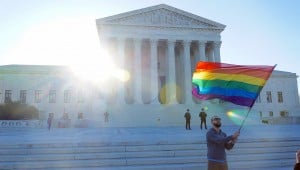
(Ted Eytan / Flickr)
It’s the Summer of Sum-Revs (Summary Reversals).
Oh boy. For a little while, it was looking dicey to be an LGBT parent in Arkansas. Fortunately, the U.S. Supreme Court stepped into the mix on Monday. The Court issued a per curiam summary reversal of an Arkansas Supreme Court decision, and made Arkansas a better place to live if you are if you are married to person of the same sex as you, and have or want to have kids.

The Trump Gold Card: A New $1 Million Pathway To A U.S. Green Card
A new proposal would let wealthy foreign nationals secure an opportunity for a U.S. green card with a $1 million 'gift' to the government, sparking legal and ethical debate.
Last December, I wrote about the saga of the Arkansas Supreme Court’s latest anti-LGBT decision. That decision had ruled that the State did not have to include the female spouse of a woman giving birth on the child’s birth certificate. In short, the decision had set up a perverse regime: if a woman married to a man gave birth after using artificial insemination, both parents would go onto a birth certificate. But if the same woman was married to another woman, the female spouse would not go onto the birth certificate. Lame.
The only difference between the two cases was that a male spouse of a woman was in a better position than a female spouse of a similarly situated woman. Remember, neither spouse in these hypotheticals was actually the biological parent of the baby; in both cases, we are talking about a situation where a third party—typically an anonymous sperm donor—provides the genetic material for a baby to be born.
What do you call it when the law treats gay women worse than straight men, for no good reason? Unconstitutional.
Yesterday, the Supreme Court confirmed that normal American law also applies to Arkansas in Pavan v. Smith. The Court found that the Arkansas ruling was inconsistent with the Court’s decision exactly two years earlier in Obergefell v. Hodges, which granted same-sex couples the right to marry and to enjoy “the constellation of benefits that the States have linked to marriage.”

Chrometa: Turning Time Into Billable Value For Modern Lawyers
Adoption of Chrometa represents more than a technological upgrade; it reflects a professional philosophy that values accuracy, transparency, and efficiency.
Arkansas Isn’t The Only State With Issues. The Natural State’s neighbor, Tennessee, has been struggling with similar post-Obergefell parentage issues. Tennessee recently passed a law that words can take only their “natural” meaning in statutes. In other words, a statute that provides that the “husband” of a woman giving birth is the father of the child (regardless of having a genetic connection to the child) cannot be read to state that “husband” includes the more general terms “spouse” or “wife.”
In response to the passage of the natural meaning law, prominent Tennessee assisted reproductive technology (ART) attorney Julia Tate-Keith brought suit on behalf of multiple pregnant same-sex couples concerned for non-biological mother’s rights to the child. In light of Pavan, it’s hard to imagine the “natural” meaning law surviving. Indeed, we may be in store for more sum-revs.
A Certain New Justice Did Not Agree. The Supreme Court’s newest justice, the Honorable Neil Gorsuch– joined by Justices Thomas and Alito–dissented in Pavan. His core argument: “it seems far from clear what here warrants the strong medicine of summary reversal.” He noted Arkansas’s argument that “rational reasons exist for a biology based birth registration regime, reasons that in no way offend Obergefell—like ensuring government officials can identify public health trends and helping individuals determine their biological lineage, citizenship, or susceptibility to genetic disorders.”
With all due respect to the new Justice, the Arkansas regime is hardly concerned with actual “biological tracking” interests. It says nothing about a non-biological, opposite-sex spouse, but it takes issue with a same-sex spouse. The statute is motivated by anti-LGBT animus alone.
Masterpiece Cake. Yesterday, the Supreme Court also announced that it would be hearing an appeal in the “Masterpiece Cakeshop” case. In that case, the owner of the Colorado bakery, Jack Phillips, declined to bake and decorate a wedding cake for a same-sex couple, Charlie Craig and David Mullins. Phillips cited his religious objections to same-sex marriage, and did not want to play a role in facilitating the happy couple’s wedding ceremony. In May 2014, the Colorado Civil Rights Commission found in favor of Craig and Mullens, and determined that Phillips had violated the State’s public accommodations law; his religious objections were no excuse. The Colorado Court of Appeals affirmed the Commission, and now SCOTUS will review the Colorado court. (For a fuller article on how the case got where it is today, check out this brilliant article by someone I have eaten wedding cake with.)
Put simply, we know now that birth certificates are included in the constellation of benefits confirmed for same-sex couples. Next up, we will learn if compelling bakers to bake and decorate cakes is also in that constellation.
Pavan v. Smith [U.S. Supreme Court]
Masterpiece Cakeshop Inc. v. Colorado Civil Rights Commission [State Courts Guide]
Earlier:
- Arkansas Just Became An Even Worse Place To Be A Parent If You’re Gay
- Anti-Obergefell Forces Pass ‘Natural’ Meaning Law
 Ellen Trachman is the Managing Attorney of Trachman Law Center, LLC, a Denver-based law firm specializing in assisted reproductive technology law, adoption, and estate planning, and Co-Director of Colorado Surrogacy, LLC, a surrogacy matching and support agency. You can reach her at [email protected].
Ellen Trachman is the Managing Attorney of Trachman Law Center, LLC, a Denver-based law firm specializing in assisted reproductive technology law, adoption, and estate planning, and Co-Director of Colorado Surrogacy, LLC, a surrogacy matching and support agency. You can reach her at [email protected].